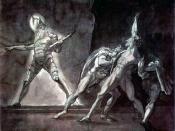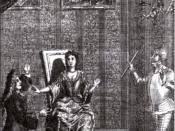It is without doubt that William Shakespeare has created many unique, thought - provoking characters. Hamlet is by far Shakespeare's most compelling character. In Shakespeare's play Hamlet, various character traits, exhibited by Hamlet, can be seen through his foils. Similarities with Hamlet and Horatio's education, as well as their levels, can be drawn. However, Hamlet's character is in constant change and even philosophical. Fortinbras, without question encompasses many of Hamlet's qualities. They are both born with nobility, along with a similar lineage. However, Fortinbras is more aggressive and even sneaky. Laertes, Hamlet's late antagonist, is both impulsive and righteous. However, they differ in terms of their nobility, as well as their father's behaviour. The character traits exemplified by Hamlet also comprise his foils.
In relation to Hamlet's three foils, Horatio is the most dissimilar. When Horatio first enters the play, Hamlet says, "And what make you from Wittenberg, Horatio."
(I,ii,171) Hamlet is making reference to the city that their university, which they both study at, is located. With respect to education, these two characters are one; they are both deemed scholars. One characteristic also shared between the two is their courage. When the ghost first appears Horatio fiercely challenges him, "By heaven I charge thee speak." (I,i,58) Ghosts are unique in the respect that they are the supernatural; they are able to walk through doors, be immune to fires and even ascend. Thus, upsetting a ghost is certainly a courageous act as Horatio is easily susceptible to consequence. Another similarity, these two characters demonstrate is their belief in God. When the ghost leaves Horatio says, "Before my God, I might not this believe." (I,i,65) Hamlet also makes reference to an afterlife, "But that the dread of something after death, /The undiscovered country from whose bourn/No traveller returns." (III,i, 85-87)...


